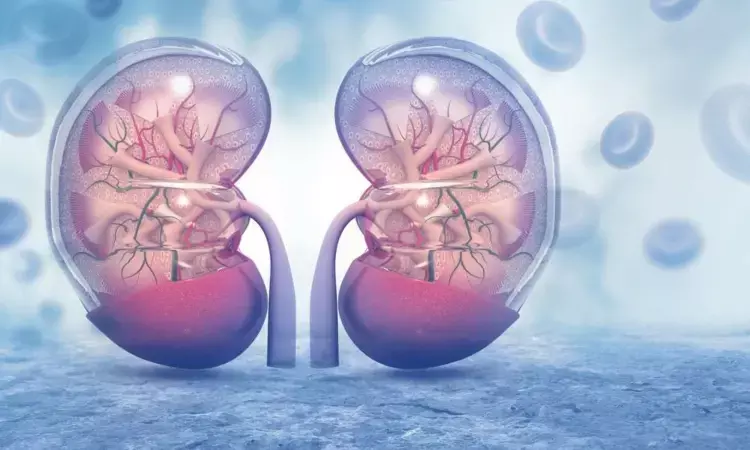- Home
- Medical news & Guidelines
- Anesthesiology
- Cardiology and CTVS
- Critical Care
- Dentistry
- Dermatology
- Diabetes and Endocrinology
- ENT
- Gastroenterology
- Medicine
- Nephrology
- Neurology
- Obstretics-Gynaecology
- Oncology
- Ophthalmology
- Orthopaedics
- Pediatrics-Neonatology
- Psychiatry
- Pulmonology
- Radiology
- Surgery
- Urology
- Laboratory Medicine
- Diet
- Nursing
- Paramedical
- Physiotherapy
- Health news
- Fact Check
- Bone Health Fact Check
- Brain Health Fact Check
- Cancer Related Fact Check
- Child Care Fact Check
- Dental and oral health fact check
- Diabetes and metabolic health fact check
- Diet and Nutrition Fact Check
- Eye and ENT Care Fact Check
- Fitness fact check
- Gut health fact check
- Heart health fact check
- Kidney health fact check
- Medical education fact check
- Men's health fact check
- Respiratory fact check
- Skin and hair care fact check
- Vaccine and Immunization fact check
- Women's health fact check
- AYUSH
- State News
- Andaman and Nicobar Islands
- Andhra Pradesh
- Arunachal Pradesh
- Assam
- Bihar
- Chandigarh
- Chattisgarh
- Dadra and Nagar Haveli
- Daman and Diu
- Delhi
- Goa
- Gujarat
- Haryana
- Himachal Pradesh
- Jammu & Kashmir
- Jharkhand
- Karnataka
- Kerala
- Ladakh
- Lakshadweep
- Madhya Pradesh
- Maharashtra
- Manipur
- Meghalaya
- Mizoram
- Nagaland
- Odisha
- Puducherry
- Punjab
- Rajasthan
- Sikkim
- Tamil Nadu
- Telangana
- Tripura
- Uttar Pradesh
- Uttrakhand
- West Bengal
- Medical Education
- Industry
SGLT-2 inhibitors and MRAs combo reduces cardiovascular events in patients with CKD

A new study published in Diabetes Research and Clinical Practice suggests that combination of sodium-glucose cotransporter-2 (SGLT-2) inhibitors and mineralocorticoid receptor antagonists (MRAs) may reduce cardiovascular (CV) events more than either SGLT-2 inhibitors or MRAs alone.
Renin-angiotensin-aldosterone system (RAAS) inhibitors and mineralocorticoid receptor antagonists are the pillars of disease-modifying therapy in patients with CKD or systolic heart failure to reduce renal disease progression and heart failure hospitalizations. Independent of diabetes status, sodium-glucose cotransporter 2 (SGLT2) inhibitors prolong life in patients with CKD or systolic heart failure and lower the risk of cardiovascular events and renal disease progression. Mineralocorticoid receptor antagonists and sodium-glucose cotransporter-2 inhibitors have both been found to minimize cardiovascular events in people with type 2 diabetes (T2D) and chronic kidney disease (CKD). However, there is little data to support the advantages of their combined usage. As a result, this study was conducted by Shunichiro Tsukamoto and team with the purpose to see how combination treatment with sodium-glucose cotransporter-2 inhibitors and mineralocorticoid receptor antagonists affected cardiovascular and renal outcomes in type 2 diabetes patients.
Researchers conducted systematic searches in the MEDLINE, PubMed, EMBASE, and Cochrane Library databases until July 2022. In individuals with T2D and CKD, randomized controlled studies comparing SGLT-2 inhibitors, MRAs, or SGLT-2 inhibitor + MRA combination treatment with placebo were chosen. To compare the therapies indirectly, a network meta-analysis was used. A composite of CV events was the primary outcome.
The key findings of this study were:
1. Eight trials with a total of 36,186 patients were chosen.
2. When compared to the other groups, the combination treatment group had a considerably better main result.
3. Furthermore, the combination treatment was linked to a significant reduction in the risk of hyperkalemia.
In conclusion, from the results of this study it is clearly seen that this combination might be a promising therapy option for people with T2D and CKD.
Reference:
Tsukamoto, S., Morita, R., Yamada, T., Urate, S., Azushima, K., Uneda, K., Kobayashi, R., Kanaoka, T., Wakui, H., & Tamura, K. (2022). Cardiovascular and kidney outcomes of combination therapy with sodium-glucose cotransporter-2 inhibitors and mineralocorticoid receptor antagonists in patients with type 2 diabetes and chronic kidney disease: a systematic review and network meta-analysis. In Diabetes Research and Clinical Practice (p. 110161). Elsevier BV. https://doi.org/10.1016/j.diabres.2022.110161
Neuroscience Masters graduate
Jacinthlyn Sylvia, a Neuroscience Master's graduate from Chennai has worked extensively in deciphering the neurobiology of cognition and motor control in aging. She also has spread-out exposure to Neurosurgery from her Bachelor’s. She is currently involved in active Neuro-Oncology research. She is an upcoming neuroscientist with a fiery passion for writing. Her news cover at Medical Dialogues feature recent discoveries and updates from the healthcare and biomedical research fields. She can be reached at editorial@medicaldialogues.in
Dr Kamal Kant Kohli-MBBS, DTCD- a chest specialist with more than 30 years of practice and a flair for writing clinical articles, Dr Kamal Kant Kohli joined Medical Dialogues as a Chief Editor of Medical News. Besides writing articles, as an editor, he proofreads and verifies all the medical content published on Medical Dialogues including those coming from journals, studies,medical conferences,guidelines etc. Email: drkohli@medicaldialogues.in. Contact no. 011-43720751


